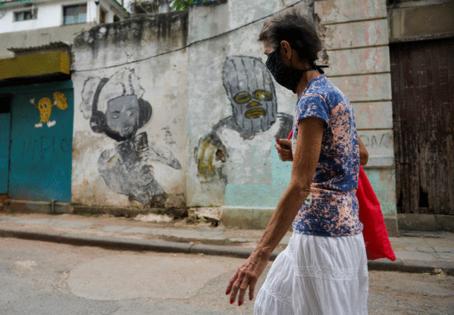Minister ignites uproar saying Cuba has no beggars, only people 'disguised as beggars'
Published in News & Features
Cuba’s economy continues in free fall, with no apparent end in sight.
That much was clear from a report by the country’s economy minister to members of the National Assembly on Monday. The minister, Joaquín Alonso, said the economy contracted by another 1.1% last year — a conservative estimate, according to Cuban economists — down from an overly optimistic 2% growth plan.
In the last five years, he said, Cuba’s economy has shrunk by 11%. Agriculture declined by over 50% during that period, which explains why food scarcity is such a pressing issue in the country.
The minister did not sugarcoat this year’s situation, which appears even worse.
In the first semester, exports were down 38% from what was expected this year, and imports covered only 67% of the country’s needs laid out in the government’s plans. The number of tourists fell to 1.6 million, about 30% less than what was expected.
Shortages of oil, diminished energy generation, high international prices and a large foreign debt all weighed negatively on the economy, Alonso told a National Assembly commission discussing economic issues ahead of a full session starting this Wednesday.
As has been the case in recent years, Cuban authorities have acknowledged that the current path is unsustainable, yet have failed to announce any significant reforms.
“We need to transform our approach,” Cuba’s leader, Miguel Díaz-Canel, told members of the National Assembly commission. “We often try to solve problems by redistributing scarce resources, but I must responsibly point out that the country’s current income is insufficient to acquire the essential raw materials required to increase domestic production.
“The core of the problem is wealth generation,” he added, without further venturing on how to fix it, beyond vague calls to increase production.
Amid the depressing assessment of Cuba’s economy, a report about the 2024 state budget presented by Minister of Finance and Prices Vladimir Regueiro Ale let slip one striking fact: Taxes paid by the island’s small private sector, including cooperatives and the self-employed, accounted for 23% of the state’s tax revenue. The figure, 58 billion pesos, would be enough to cover, for example, the country’s entire social security and social assistance budget, which was 52 billion pesos last year.
About 60% of that tax money was paid by micro, small and medium enterprises, known by their Spanish acronym mipymes, the report states.
That means the Cuban government is increasingly relying on the private sector to fund public services, suggesting that despite efforts to restrict them, private enterprises have become too crucial for the government to be eliminated entirely, as has happened in the past.
‘No beggars in Cuba’
Beyond the disastrous state of the economy, comments by the Minister of Labor and Social Security during a presentation to a National Assembly commission, disparaging the homeless and Cubans begging on the streets, caused such an uproar that on Tuesday, Díaz-Canel issued a reprimand without naming the top official, Marta Elena Feitó.
“We’ve seen people who appear to be beggars,” Feitó told the commission. “When you look at their hands, at the clothes these people are wearing, they’re disguised as beggars; they’re not beggars. There are no beggars in Cuba.”
The minister also denied that some of the poorest Cubans search for food in garbage bins on the streets.
“Those people in the garbage dumpsters are looking for cans,” she said. “They’re not looking for food. That’s not true either. They’re recovering raw materials. They’re self-employed illegals who are violating the tax authorities.”
She also complained that the homeless label was used too liberally by the public. As an example, she said that people who offer to clean the windshields of cars stopped at the traffic lights were not homeless, but “people who have found an easy way of life, and possibly with that money are going to drink alcohol at the street corner.”
“We shouldn’t roll down the window and give them money; we should fight them. We can’t allow this behavior,” she added.
Díaz-Canel responded Tuesday by calling out her “questionable lack of sensitivity in addressing vulnerability” in an X posting that did not identify the minister. On Tuesday, Cuba’s leader appeared before the same National Assembly commission and called her comments “counterproductive,” “superficial,” and projecting a sense of “lack of knowledge of the country’s reality.”
“These people, whom we sometimes describe as beggars or those linked to begging, are in fact concrete expressions of the social inequalities and accumulated problems we face,” he said. “These people are not our enemies. We are not defending the Revolution when we hide the problems we have.”
_____
©2025 Miami Herald. Visit miamiherald.com. Distributed by Tribune Content Agency, LLC.







Comments